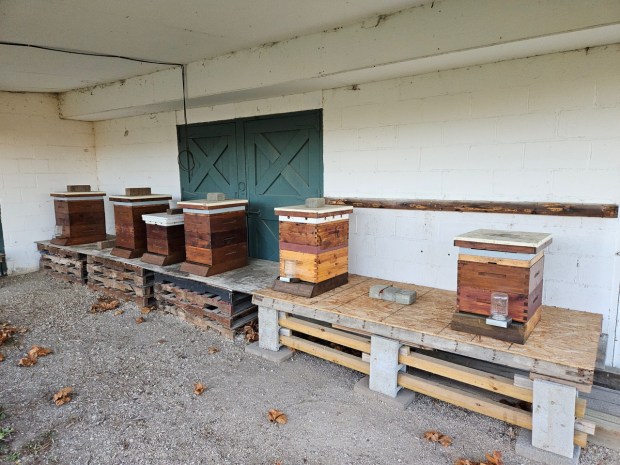A longtime Hinsdale resident is helping to create a bigger buzz about the Oak Brook Park District’s bee apiary at the Dean Nature Sanctuary.
Dale Kleber’s interest in honey bees began about 15 years ago when he read about colony collapse disorder, which reportedly was killing off 30% to 50% of the insects in managed bee hives each year in the United States.
“I learned that about one-third of the food we eat is produced through pollination and that honey bees and other native bees were perishing at an alarming rate,” he said. “The more I learned, the more fascinated I became with bees and the various environmental and man-made challenges that the species faces.”
Kleber started beekeeping in 2016 after his children gave him a bee hive for Christmas. A few years ago, he came across the bee hives at the Dean Nature Sanctuary, 115 Canterberry Lane, while out for a bike ride. The bee apiary also opened in 2016.
“I was an executive at Dean Foods for many years and had met Dorothy Dean on various occasions when she still lived on the property, prior to the Dean family transferring it to the Oak Brook Park District to become the Nature Sanctuary,” Kleber said. “One of my bike riding routes takes me past the Nature Sanctuary and one day I decided to take a detour and ride up the road to the old horse stables, where I discovered a few hives in the back.”
After his initial visit, Kleber said he watched the apiary over the course of a few years and noticed that none of the hives were surviving the winter.
“I also noticed there was a separate roofed hive platform that wasn’t being used, so I contacted Bob Johnson, the deputy director of the Oak Brook Park District, and we started talking,” Kleber said. “I convinced him to let me bring in some of my backyard bees in to start some more hives at the Nature Sanctuary, since all of its wildflowers are an ideal habitat for bees.”
“Connecting with Dale has been a blessing,” Johnson said. “His enthusiasm for, and expertise in, beekeeping has improved the health of the bee colonies and will allow us to add more hives next season. Dale is a true example of a selfless volunteer.”
After Kleber became involved, he and Johnson worked together for the betterment of the bee apiary.
“Bob is knowledgeable about bees and has some hands-on experience, so we talked bees, and I shared some of my techniques on how I like to configure a hive,” Kleber said.
Johnson adopted Kleber’s suggestions, and last winter was the first time any hive had successfully survived through the cold season intact at the Nature Sanctuary, Kleber said.
“I’m not sure those changes made the difference, or we just got lucky,” he said. “Beekeeping is not easy, and there is a bit of a learning curve.”
At the beginning of 2024, Johnson asked Kleber if he would like to be the head beekeeper at Oak Brook’s bee apiary, a position Kleber gladly accepted. He currently manages and maintains the hives
“We added a few new hives late this spring, but also lost a few hives just recently,” Kleber said. “We are going into this winter with only two hives; however, they look quite strong, and I am optimistic that they will still be buzzing this spring.”
Kleber and Johnson also are working on future expansion plans.
“The goal is to make the apiary fully self-sustaining, meaning the Park District will not need to buy bees every year,” Kleber said. “We should be able to split the surviving hives next spring and create an additional 2-4 new hives.”
Kleber said he encourages people to visit the bee apiary for an interesting experience.
“Anyone can walk behind the stable and observe the hives in the back, which are in the open but under a roof,” he said “It is interesting to watch the bees enter and exit the hive. There is a good reason for the expression, ‘busy as a bee.’
“Contrary to popular belief, honey bees are quite docile and have been bred for gentleness. They are not inclined to sting unless the hive is threatened. Still, it is a good idea to stay 20-30 feet from the hives.”
Kleber said that one of the key purposes of the apiary at the Dean Nature Sanctuary is to educate people about the critical role that bees play in the ecosystem.
“It has been said that if bees disappeared off the surface of the globe, then man would have only four years of life left. No more bees, no more pollination, no more plants, no more animals, no more man,’” he said. “When I am working at the apiary, people frequently stop by and are full of questions about bees.”
Johnson said when the hives at the apiary produce enough honey to be harvested without risking the health of the colony, the community will have the opportunity to purchase it through the Oak Brook Park District Foundation.
When available, the honey may be purchased at the Family Recreation Center, 1450 Forest Gate Road and Tennis Center, 1300 Forest Gate Road. The cost for 1/2 pound of honey is $10.
More information is available online at www.obparks.org/dean-nature-sanctuary-apiary.
Jesse Wright is a freelance reporter for Pioneer Press.



